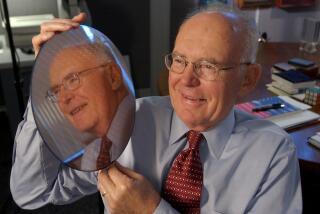THE TIMES 100 : THE BEST PERFORMING COMPANIES IN CALIFORNIA : THE BOTTOM LINE : From Bootstrap Upstart to No. 1 : Gordon Campbell Gets Sweet Revenge on Doubters With Cash-Rich Chips & Technologies
- Share via
When Gordon A. Campbell went in search of seed money for a high-tech start-up in 1985, he talked to 60 venture capital companies. All turned him down--partly because of his spotty track record.
Many are probably kicking themselves around the block today. Campbell’s venture, Chips & Technologies, zoomed to the top of The Times 100 list, making an impressive debut with a two-year average of 66.5% in return on equity, the profit a company earns for each dollar that shareholders invest.
Not bad for a little venture that scraped by in a tough first year with $1.5 million of initial financing. Not bad for an outfit that started with Campbell and one assistant, and now has 450 employees. Not bad for a bootstrap upstart with $12.7 million in 1986 sales that one high-tech analyst projects will top $215 million in sales for 1989.
Last year, the San Jose-based firm did not even qualify because it did not meet the criterion for length of public ownership.
Campbell, 44, humbly acknowledges that luck might have had a little to do with this raging success. Chips & Technologies was in the right place at the right time with a technology that made possible the production of inexpensive clones of IBM personal computers.
At the time the company got its start, PC clone makers needed 150 chips to make one computer. Chips & Technologies devised sets of chips that performed more functions but reduced the number of components.
“It saved manufacturers money and gave them higher performance and more features,” said Campbell, chairman, president and chief executive.
High-powered customers such as Wyse Technology, AST Research, Tandy and others took to the new product immediately. By Campbell’s estimate, Chips & Technologies now has 70% of its market.
“Chips & Technologies was a crucial piece in the development of clones,” said Benny Lorenzo, an analyst with the Volpe & Covington investment firm in San Francisco.
Chips & Technologies is loaded with cash and has very little debt. For fiscal 1989, Lorenzo expects the company to have gross margins of more than 50% and net margins of more than 14%, compared to net margins of about 5% for the average Standard & Poor’s 500 company. (Gross margin, which is expressed as a percentage of gross revenues, is sales minus the costs of producing the goods. Net margin is the profit left after also paying taxes and costs for administration, marketing, and research and development.)
Campbell acknowledges that giant semiconductor companies could eventually try to squeeze out their small rival, but, he notes, “they gave us a head start.”
For Campbell, a former Intel marketing executive, the success of Chips & Technologies has been sweet revenge. Several years ago, with lofty ambitions and millions of dollars in venture capital, he left Intel and founded Seeq Technology.
Intel sued, contending that Campbell and his colleagues would illegally be using Intel technology to begin their business. The suit was settled out of court.
Campbell developed a reputation for a lavish management style, with elegant headquarters and expensive parties featuring entertainers such as Ray Charles. The company, meanwhile, was not measuring up to its backers’ expectations.
When Seeq nearly foundered, the venture capitalists were so annoyed that they booted him out. Later, nobody would touch Campbell’s new venture, according to Richard A. Schaffer, publisher of the Technologic Computer Letter in New York. (Under different management, Seeq is now staging a comeback.)
After Chips & Technologies started booming, though, Campbell got letters from some of those venture capitalists.
More to Read
Inside the business of entertainment
The Wide Shot brings you news, analysis and insights on everything from streaming wars to production — and what it all means for the future.
You may occasionally receive promotional content from the Los Angeles Times.










